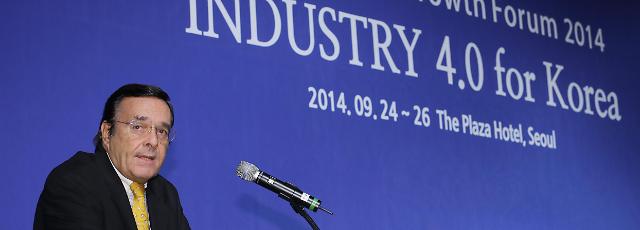
Mario Ohoven, president of the BVMW (German Association for Small and Medium-sized Businesses), said this revolution is characterized by an intelligent interconnection of machines, and information and technology (IT) which promotes the efficiency of resources and the flexibility. BVMW stands for
In his keynote at the sixth Global Green Growth Forum (GGGF) in Seoul Wednesday, Ohoven asked people to "look beyond their own horizon and follow the example of South Korea." The 2014 GGGF opened at Seoul Plaza Hotel earlier in the day for a three-day run under the theme of Industry 4.0. The annual event is hosted by The Aju News Corporation.
He noted that 94 percent of the Internet connections are working with a fast broadband technology in South Korea, compared with 75 percent for Germany, 69 percent for France and 57 percent for Italy.
Secondly, Ohoven urged Europe to invest more in education as well as research and development (R&D) to keep up with other competitors.
Europe, with only 1.9 percent of the gross domestic product (GDP), is still investing one percentage point less than the United States and 1.6 percentage points less than Japan in R&D, he said.
He also called for more graduates in mathematics, IT/computer sciences, natural sciences and technology, i.e. in the so-called MINT disciplines.
Ohoven pointed out that in Europe, only 17 percent of the university students study MINT subjects, saying that the comparable figure stands at 29 percent for South Korea and 31 percent for China.
"The success of the ICT industry in those countries attracts young people, whereas technology is often regarded as boring or even dangerous in Europe," he said, adding that "this way, we won't be able to survive in the age of Industry 4.0."
Thirdly, Ohoven said, "we need more startups in Europe in order to establish new ideas and business models."
Startups should be given better funding opportunities by means of tax incentives for venture capital, he said, noting that less than US$4 billion of venture capital is invested in Europe, whereas in the United States, approximately $20 billion is invested.
Silicon Valley attracts innovative founders, while Europe becomes less attractive for startups, Ohoven said.
Copyright ⓒ Aju Press All rights reserved.


![[GGGF2021] Kakao Webtoon presents goal of establishing a K-story global silkroad led by web cartoons](https://image.ajunews.com/content/image/2021/09/09/20210909175503135320.jpg)

![[GGGF2021] Chinese scholar urges Washington to stop pressure on Beijings science and technology buildup](https://image.ajunews.com/content/image/2021/09/09/20210909165533292006.jpg)